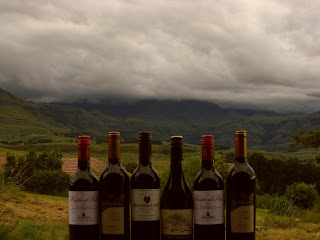

Day 228, Perhaps it isn’t really surprising but increasingly I have noticed that this is a country of contrasts. Even in the slight microcosm of the province of Kwazulu Natal I have become more aware of how varied it is, not just in terms of the people and the poverty but also in the very geography of the region itself.
The weekend just gone is typical of how different worlds exist in this little corner of the planet. Being a public holiday on Monday, my friends and I took the opportunity to visit the world heritage site of the Drakensberg Mountains. The range is located in the middle of the province on the borders with the land locked nation of Lesotho. Its peaks are sought after by climbers and the rivers running through are bountiful with fish.
Driving through the approach to the mountains one notices the cooling down of the air and the sun loses its harshness, becoming almost sweet. The defiant thorny shrubbery with yellow and green fruit in our region is noticeably supplanted by more flowery, gentle foliage with dashes of bright red and blue. The undulating landscape is more reminiscent of the Cotswolds than it is of the Ubombo mountains.
The houses we pass on the motorway also bear a more than passing resemblance to British country life. Much of this part of Kwazulu Natal had English forefathers and there are plenty of tributes to the “old country”, from the village bakeries, to the mock Tudor bungalows, to even grandiose estates. We visited a restaurant in such an estate known as Hartford House, a indulgence of gastronomic pleasure, it compares to the Michelin starred haunts found peppered along the English countryside.
But as with everything here, it is within the populations that we see the starkest differences. We struggle with the burden of HIV and TB and the locals will beg, steal and borrow to try and put food on the table (usually metaphorical as they are often unable to afford them). Whilst in the pleasant hills of the Drakensberg Arabian thoroughbreds are reared and ridden, tea is sipped and scones are had in view of the marvellous Cathedral Peak, and people while away the time trout fishing or golfing.
Though the Zulus in the mountain region have found innovative ways to try and earn some money. Boys with bags of golf balls fished out of the rivers from wayward linksmen will stand by the roadside in hope of selling a few to the next hopefuls. Children also gather to sing and dance for loose change as shoppers stock up at the supermarket and visit the oddities at the curio store.
Driving seven hours back to our region, with the heat becoming oppressive it is no wonder that life can be difficult here. It is in a forgotten corner of the country where people try to eke out an existence in any manner they can. One wonders whether most here would know about how many in their country live without the same trials and tribulations. The hope is that though the climate may not change, at least people having to live in poverty and disease may do so.
No comments:
Post a Comment